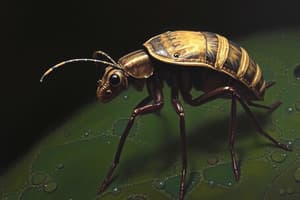Podcast
Questions and Answers
How do arthropods grow?
How do arthropods grow?
- By forming new exoskeletons
- By moulting (correct)
- By continuous growth
- By shedding body parts
What is the analogue of blood for most arthropods?
What is the analogue of blood for most arthropods?
- Plasma
- Haemolymph (correct)
- Lymph
- Hemoglobin
What is the material that forms the exoskeleton of arthropods?
What is the material that forms the exoskeleton of arthropods?
- Lignin
- Chitin (correct)
- Keratin
- Collagen
What is the body cavity through which haemolymph circulates in arthropods called?
What is the body cavity through which haemolymph circulates in arthropods called?
What type of nervous system do arthropods have?
What type of nervous system do arthropods have?
Flashcards are hidden until you start studying
Study Notes
Arthropod Growth and Development
- Arthropods grow through a process of molting, where they shed their exoskeleton and replace it with a new, larger one.
- This process allows them to increase in size and accommodate changes in their body shape and structure.
Arthropod Circulatory System
- The analogue of blood for most arthropods is haemolymph, a clear, colorless fluid that circulates nutrients and oxygen throughout the body.
- Haemolymph is a mixture of water, salts, and organic compounds that bathes the internal organs and tissues.
Exoskeleton Composition
- The exoskeleton of arthropods is formed from a tough, flexible material called chitin, which is composed of polysaccharides.
Body Cavity and Haemolymph Circulation
- The body cavity through which haemolymph circulates in arthropods is called the haemocoel.
- The haemocoel is a fluid-filled space that surrounds the internal organs and allows for the exchange of nutrients and waste products.
Arthropod Nervous System
- Arthropods have a decentralized, ventral nervous system, which consists of a ventral nerve cord and a series of ganglia that control specific body regions.
- This type of nervous system allows for rapid and flexible responses to sensory stimuli.
Studying That Suits You
Use AI to generate personalized quizzes and flashcards to suit your learning preferences.




